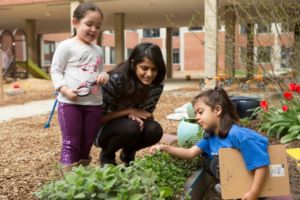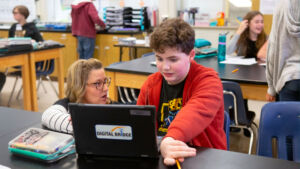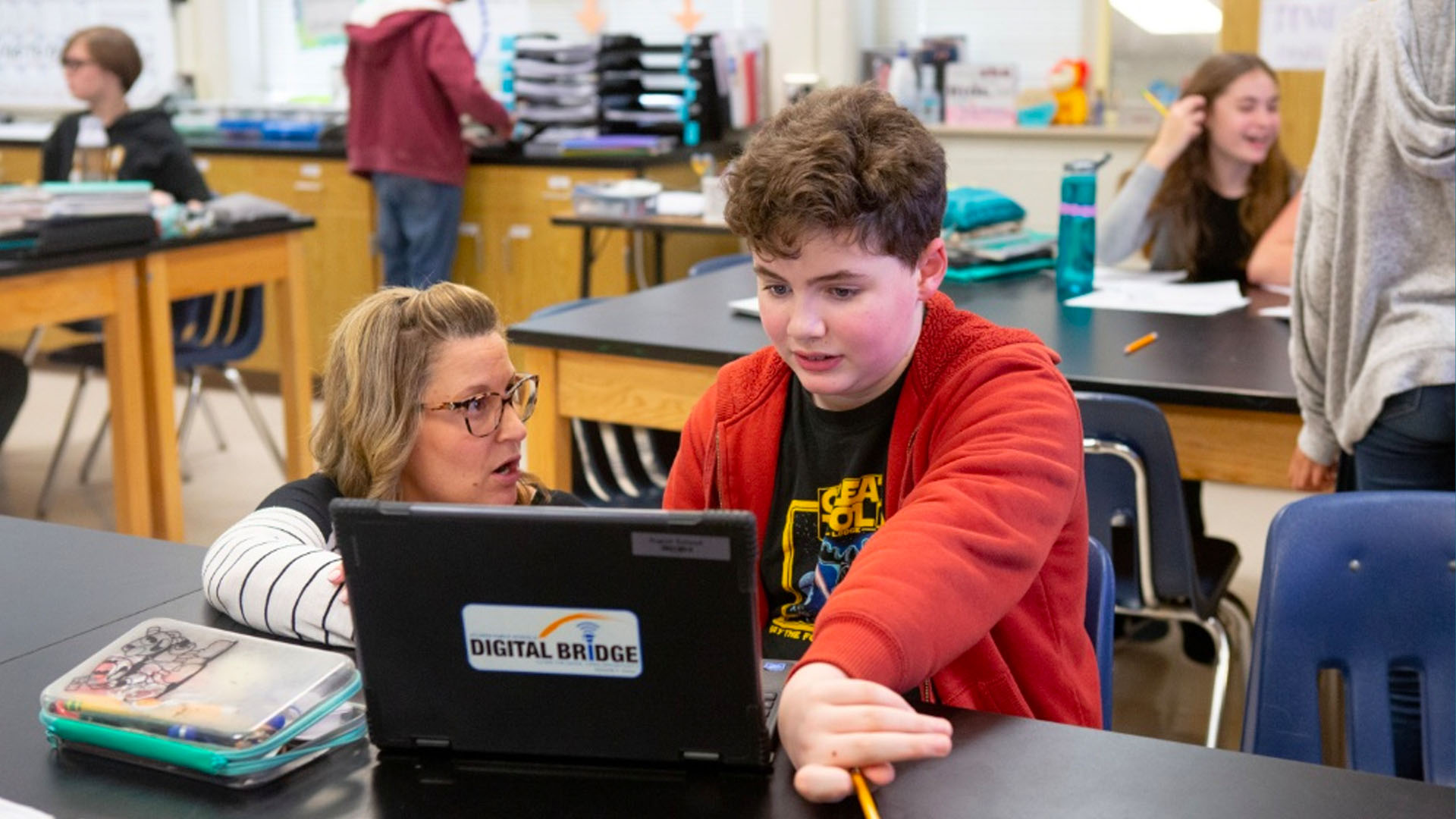Mia & Erin are both passionate educators at different places in their professional journeys. As we all wonder about the future of education, take a moment to pause with them as they consider questions about special education from Jason, an adult with disabilities.
Who are we?
Erin
Like many of you, I have been teaching for quite a while. Twenty-five years ago I got my first teaching job at a public elementary school in Indianapolis. After five years of teaching 3-5th graders and going to grad school, I got my special education degree and license, and I made the switch to being a special educator. I always knew I wanted to be a special educator, but I let a teacher I was working with for a practicum in undergrad talk me out of it. I am only a little bit mad at her for that. I know I am a better special educator because I had spent time as a general ed teacher, too. It gave me an important perspective. I eventually ended up where I wanted to be anyway.
Mia
I’m an education major going into my junior year of college. As a kid, I always wanted to be a teacher, just like my brothers and dad, but eventually, I was convinced by family and others that the education field was just getting too difficult to work in. So I came to college without a major, and I was considering healthcare or social work. Then last summer, when I volunteered at a summer school for pre-K through third graders, I just fell in love with being in the classroom; that was it, I was an education major. I’m so excited about what I’ve been learning in my education courses, and though I’m not currently planning on working in special education, I’m passionate about working with kids with disabilities in my classroom.
Jason
I work full-time in a warehouse and live independently. In my spare time, I like participating in Special Olympics, where I have been an athlete for over 30 years. I am currently the chairperson of my district’s Athlete Leadership program. I enjoy movies, sports, music, eating out, and spending time with my six nieces and nephews.
Erin
Mia and I know each other from school. I teach at the university she attends. Since she is studying to become a teacher, and I’ve been in the field for a while, we thought it interesting to think through a few special education topics coming from our different perspectives. Mia and I were struggling to come up with topics to write about so we asked someone who knows a whole lot more than we do, Jason Glenn. Jason is the real expert on this topic because he grew up getting academic and social support from special educators. Jason is a long-time friend of our college and the most encouraging person you’ll ever meet.
Teachers, especially those of us that work with kids with disabilities, need to have grace with ourselves.
What is the most important thing a teacher needs to remember when there are students with disabilities in their classrooms?
Mia

I think the most important thing a teacher needs to remember is that students with disabilities are capable, and they belong there. To me, the most valuable thing is to make students with disabilities feel as though they belong in the classroom alongside their peers and that they fit in. To do that, they need time in the classroom. Of course, there needs to be one-one-one time with teachers and time outside of a bigger classroom to make sure every need is met. That is essential. Yet without that special time with other students, without being a part of the silly brain breaks, the crafts, the kid and teacher story times, the group work… the child will ultimately feel left out. Since the world has tended to leave them out since the beginning, we owe these kids a chance to simply fit in and be themselves around all the students. Another thing that’s key to keep in mind is specifically for the teacher: you won’t always get it right, and that’s okay. As a college student looking forward to a career in an elementary school, it’s pretty scary seeing so many teachers totally lose their passion towards something that probably once brought them great joy. Sure, they get burnt out from long days and behavior and parents, but it seems like they feel like they’ve failed, that they give and give all they can but it’s not enough. Teachers, especially those of us that work with kids with disabilities, need to have grace with ourselves. It will never be easy, but if we keep trying after we fail, if we learn why certain activities or strategies or lessons aren’t working, then we can keep going. Taking the time to change our approach and try new things with our students with disabilities and drawing from their joy, curiosity, and energy, teachers can regain and keep that passion- we will find new ways to love what we do.
Erin
I always grapple with this kind of question because I want to say to treat them like the rest of the students, but I also want to say to honor their disability and do things differently for them. Treat them the same! Treat them differently! Treat them the same! Treat them differently! Could it be that a little of both (which I know isn’t very helpful for some of you to hear) is the best approach? I suppose it is a little like that in all types of classrooms, right? We get to know our students, and then we find ways to build a community of all different kinds of learners. Then we get to work on the heavy thinking stuff, which is fun and challenging all at the same time. I think this is the type of question that I need to step aside and let my students lead me through. I feel like this generation of students, who are learning to be teachers now, have a much better sense of how to do this. I think that’s because they don’t overthink it as I do (and did, when I was a special educator in an elementary school). I spent all my time preparing to be a special educator by filling out paperwork and learning about the laws. I still remember Public Law 94-142 like I was in my own undergrad class 20+ years ago – shout out Dr. Grissom! However, I see something interestingly different in the way my college students approach students with disabilities. They have a much truer version of inclusion, and they don’t seem afraid to fight for what they believe all their students need.
No two students learn the same way. How do you plan to help each student learn?
Mia
Jason’s right, there are so many different types of learners in the classroom, and we have to understand that first before trying to teach a whole classroom. How many teachers did I have from K-12 that held tight to the “my way or the highway” way of teaching? Like, pretty much all of them. They thought they knew the best and easiest way for kids to learn, but that’s impossible! There is no one way, and we have to know our students in order to make sure that each of them are learning the best they can. To have an individual learning plan for each child, you have to make a personal connection with them. Knowing where the child is compared to other students, academically and emotionally, is the first step to making sure they will learn and succeed. We should know our students, their cultures, their families, how they feel about their homework and schoolwork, their strengths and weaknesses in and out of the classroom, and we have to do this by spending time with them and noticing them individually as a learner. Everything that goes on in their lives affects the way they learn, proving that lessons and work in class can’t be tailored to one kind of learner, but instead must provide kids a way to learn and show what they’ve learned in their best way. Once I know my students, I can build lesson plans, notes, activities, tests, and everything else according to them and their needs. If half of them need to learn math with their hands, then I provide that; if a handful find it impossible to sit still during group work and lessons, I add movement; if some understand grammar with music and music only, we write our own songs about verbs. It’s all about listening to them and using what you see and hear everyday in the classroom.

Erin
In the special education world, things like IEP’s. FBA’s, and 504 plans should play a big part in how you support your students’ unique needs. Those laws and procedures are meant to provide appropriate support and equitable access to educational opportunities for students with disabilities. However, we can’t stop there. As a former special educator, I wrote my fair share of IEP’s, and as much as I tried to encompass all the strengths and needs of my students, I recognize that there was probably lots of important information missing. I appreciate the digital IEPs that can now be updated more efficiently, and I appreciate the work of the iIEP team who improves the paperwork as new understanding emerges and laws change. In the bigger picture, though, all classroom instruction should always be focused on the students in that room. I think one of the biggest challenges is to remember that I am not teaching to a bunch of “mes.” I can’t only teach the way I learn. I have to teach and provide opportunities in line with the way my students learn. This is especially true when working with students with disabilities. Sometimes the way a student with a disability picks up a concept or shows their understanding is so drastically different than anyone else in the room. Sometimes it’s even different from the way they did it yesterday. You always have to be ready to catch the lightbulb moment. Circling back to Jason’s question, “How do I plan to help each student learn?” I plan to be ready. Ready to change and pivot and switch my thinking and plans in a million different directions if I need to. Ready to celebrate all the things that are working and rethink all the things that aren’t (because there will inevitably be things that aren’t working). Ready to advocate for everyone to have what they need so that they can show us what they know.
Resources
Please login or register to claim PGPs.
Alternatively, you may use the PGP Request Form if you prefer to not register an account.



